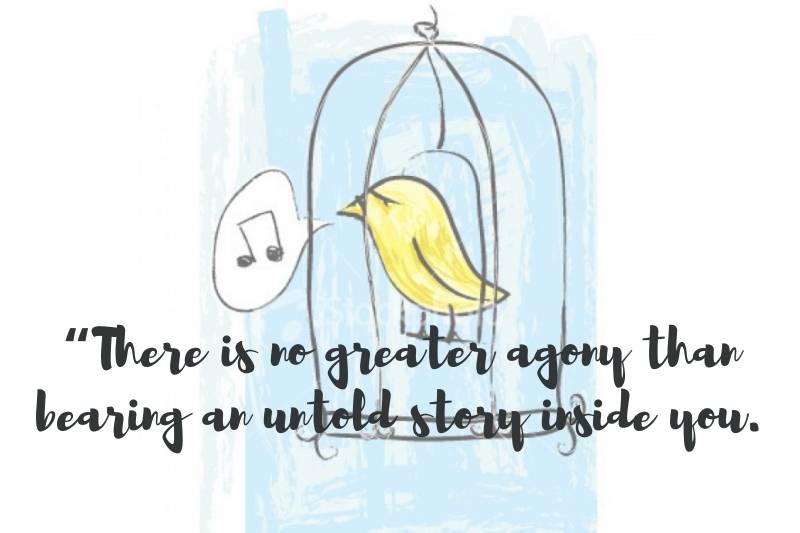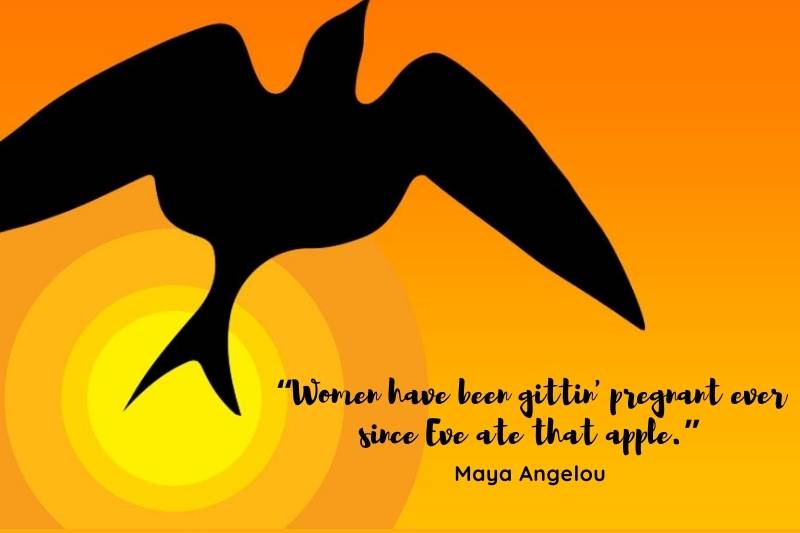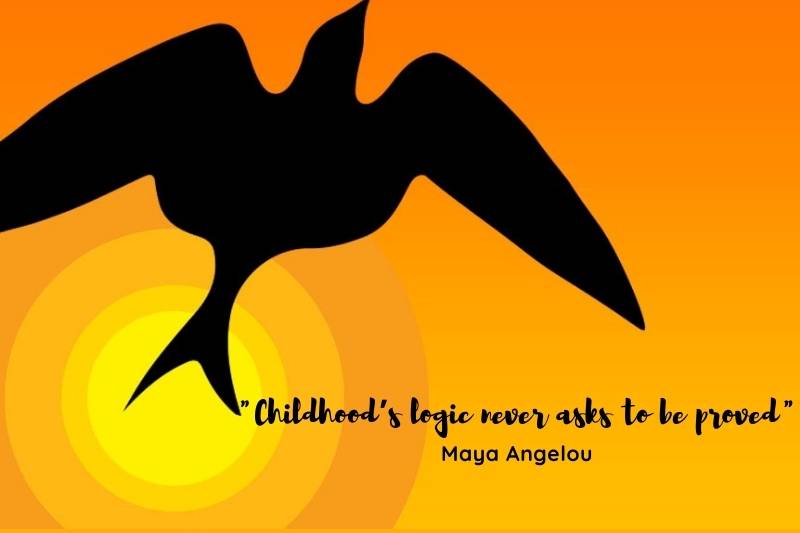Angelou was inspired to write I Know Why the Caged Bird Sings after the 1968 assassination of Martin Luther King, Jr. by meeting with James Baldwin and Jules Feiffer. This was to deal with her friend’s loss and bring attention to her struggles with racism. We have gathered many great quotes from Maya Angelou’s book. You might be interested in the I Know Why The Caged Bird Sings Quotes. Continue reading to learn more.
About I Know Why The Caged Bird Sings
“I Know Why the Caged Bird Sings” is a powerful autobiography written by the renowned author and poet, Maya Angelou.
This literary work chronicles Angelou’s life, particularly her experiences growing up as a young Black girl in the segregated American South during the 1930s and 1940s.
Through her poignant writing, Angelou delves into issues of race, gender, identity, and personal empowerment, touching the hearts of readers of all backgrounds and generations.
The book has become a classic in American literature, inspiring and enlightening readers for decades. It contains a wealth of powerful quotes and memorable passages that have resonated with countless people around the world.
From discussions on the intricacies of race relations to musings on the resilience of the human spirit, Angelou’s words offer a powerful and thought-provoking commentary on the human experience.
In this article, we will explore some of the most memorable quotes from “I Know Why the Caged Bird Sings” and delve into the themes and insights that they offer.
I Know Why The Caged Bird Sings Quotes
Pulitzer Prize-nominated author, filmmaker, and civil rights activist Maya Angelou has inspired readers for decades through her powerful words. Her legacy will continue for generations. Below are our top quotes from Angelou’s beloved memoir, I Know Why the Catbird Sings. We wanted to celebrate her 90th birthday.

There is no greater agony than bearing an untold story inside you.
Hoping for the best, prepared for the worst, and unsurprised by anything in between.
Words mean more than what is set down on paper. It takes the human voice to infuse them with shades of deeper meaning.
Anything that works against you can also work for you once you understand the Principle of Reverse.
Instead, pursue the things you love doing, and then do them so well that people can’t take their eyes off you.
The caged bird sings with a fearful trill,
of things unknown, but longed for still,
and his tune is heard on the distant hill,
for the caged bird sings of freedom.
To be left alone on the tightrope of youthful unknowing is to experience the excruciating beauty of full freedom and the threat of eternal indecision. Few, if any, survive their teens. Most surrender to the vague but murderous pressure of adult conformity. It becomes easier to die and avoid conflict than to maintain a constant battle with the superior forces of maturity.
Life is going to give you just what you put in it. Put your whole heart in everything you do, and pray, then you can wait.
I believe most plain girls are virtuous because of the scarcity of opportunity to be otherwise.
If you’re for the right thing, you do it without thinking.
The Black female is assaulted in her tender years by all those common forces of nature at the same time that she is caught in the tripartite crossfire of masculine prejudice, white illogical hate, and Black lack of power.
The fact that the adult American Negro female emerges a formidable character is often met with amazement, distaste, and even belligerence. It is seldom accepted as an inevitable outcome of the struggle won by survivors and deserves respect if not enthusiastic acceptance.
Rite, don’t worry ’cause you ain’t pretty. Plenty of pretty women I have seen digging ditches or worse. You smart. I swear to God, I rather you have a good mind than a cute behind.
Without willing it, I had gone from being ignorant of being ignorant to being aware of being aware. And the worst part of my awareness was that I didn’t know what I was aware of. I knew I knew very little, but I was certain that the things I had yet to learn wouldn’t be taught to me at George Washington High School.
The quality of strength lined with tenderness is an unbeatable combination, as are intelligence and necessity when unblunted by formal education.
She comprehended the perversity of life, that in the struggle lies the joy.
At fifteen life had taught me undeniably that surrender, in its place, was as honorable as resistance, especially if one had no choice.
If growing up is painful for the Southern Black girl, being aware of her displacement is the rust on the razor that threatens the throat. It is an unnecessary insult.
A story went the rounds about a San Franciscan white matron who refused to sit beside a Negro civilian on the streetcar, even after he made room for her on the seat. Her explanation was that she would not sit beside a draft dodger who was a Negro as well. She added that the least he could do was fight for his country the way her son was fighting on Iwo Jima. The story said that the man pulled his body away from the window to show an armless sleeve. He said quietly and with great dignity, “Then ask your son to look around for my arm, which I left over there.
People whose history and future was threatened each day by extinction considered that it was only by divine intervention that they were able to live at all. I find it interesting that the meanest life, the poorest existence, is attributed to God’s will, but as human beings become more affluent, as their living standard and style begin to ascend the material scale, God descends the scale of responsibility at a commensurate speed.”
tags: affluence, belief, god, i-know-why-the-caged-bird-sings, Maya-Angelou, poverty, religion, wealth
“When things were very bad his soul just crawled behind his heart and curled up and went to sleep
It was awful to be Negro and have no control over my life. It was brutal to be young and already trained to sit quietly and listen to charges brought against my color with no chance of defense. We should all be dead. I thought I should like to see us all dead, one on top of the other.
A pyramid of flesh with the white folks on the bottom, as the broad base, then the Indians with their silly tomahawks and teepees and wigwams and treaties, the Negroes with their mops and recipes and cotton sacks and spirituals sticking out of their mouths. The Dutch children should all stumble in their wooden shoes and break their necks. The French should choke to death on the Louisiana Purchase (1803) while silkworms ate all the Chinese with their stupid pigtails. As a species, we were an abomination. All of us.
The world had taken a deep breath and was having doubts about continuing to revolve.
Women have been gittin’ pregnant ever since Eve ate that apple.”

I had given up some youth for knowledge, but my gain was more valuable than the loss
The needs of a society determine its ethics, and in the Black American ghettos the hero is that man who is offered only the crumbs from his country’s table but by ingenuity and courage is able to take for himself a Lucullan feast.
Hence the janitor who lives in one room but sports a robin’s-egg-blue Cadillac is not laughed at but admired, and the domestic who buys forty-dollar shoes is not criticized but is appreciated. We know that they have put to use their full mental and physical powers. Each single gain feeds into the gains of the body collective.
He was a simple man who had no inferiority complex about his lack of education, and even more amazing no superiority complex because he had succeeded despite that lack.
The intensity with which young people live demands that they “blank out” as often as possible.
Until recently each generation found it more expedient to plead guilty to the charge of being young and ignorant, easier to take the punishment meted out by the older generation (which had itself confessed to the same crime short years before). The command to grow up at once was more bearable than the faceless horror of wavering purpose, which was a youth.
It takes the human voice to infuse them with the shades of deeper meaning.
Rite, don’t worry ‘cause you ain’t pretty. Plenty of pretty women I have seen digging ditches or worse. You smart. I swear to God, I rather you have a good mind than a cute behind.
As I ate she began the first of what we later called “my lessons in living.” She said that I must always be intolerant of ignorance but understanding illiteracy. That some people, unable to go to school, were more educated and even more intelligent than college professors. She encouraged me to listen carefully to what country people called mother wit. That in those homely sayings was couched the collective wisdom of generations.
Of all the needs (there are none imaginary) a lonely child has, the one that must be satisfied if there is going to be hope and a hope of wholeness, is the unshaking need for an unshakable God. My pretty Black brother was my Kingdom Come.
Language is man’s way of communicating with his fellow man and it is language alone which separates him from the lower animals.
The city became for me the idea of what I wanted to be as a grown-up. Friendly, but never gushing, cool but not frigid or distant, distinguished without the awful stiffness.
But a caged bird stands on the grave of dreams
his shadow shouts on a nightmare scream
his wings are clipped and his feet are tied
so he opens his throat to sing
Miss Kirwin was that rare educator who was in love with information. I will always believe that her love of teaching came not so much from her liking for students but from her desire to make sure that some of the things she knew would find repositories so that they could be shared again.
Can’t Do is like Don’t Care. Neither of them has a home.
I was basically good. Not understood, and not even liked, but even so, just, and better than just. I was merciful.
Although I had no regrets, I told myself sadly that growing up was not the painless process one would have thought it to be.
Childhood’s logic never asks to be proved (all conclusions are absolute)

What Lesson You Get From I Know Why The Caged Bird Sings
The book also teaches us about the importance of education and the transformative role it can play in one’s life. Maya Angelou’s journey from a young girl who was discouraged from pursuing learning to a renowned writer and scholar serves as a powerful reminder of the potential for growth and achievement through education.
Another important moral of the story is the importance of speaking out against injustice and discrimination.
Throughout the book, Maya Angelou describes the various forms of discrimination and oppression she faced, and the ways in which she fought back against these forces. Her words serve as a call to action for readers to recognize and work towards dismantling systemic racism and oppression.
FAQs
What is the message of I Know Why the Caged Bird Sings?
Maya Angelou’s I Know Why The Caged Bird Sings is a memoir that attempts to understand what happened to Angelou and offer hope to other survivors. This book’s tone is casual, easy to understand, and down-to-earth. This powerful autobiography teaches us that we should never lose heart.
Why was growing up painful for the Southern black girl?
Growing up in a South Black family is difficult. However, being aware that she has been displaced is what puts rust on her throat. Maya is forced to feel “not belonging” at an early age by her grandmother.
What is the main message of the caged bird?
“Caged Bird” focuses on freedom and confinement, artistic expression and resistance, civil rights, and other issues. Freedom and confinement: “Caged Bird” refers to both the inborn urge for freedom and imprisonment.
Conclusion
“I Know Why the Caged Bird Sings” is a story about the author’s life, growing up in the South during the Jim Crow era. The story highlights the struggles she faced as a black girl in a racist society. Despite the challenges, she persevered and went on to become a successful writer. The quotes from the story illustrate the strength and resilience of the human spirit.
Read more:
